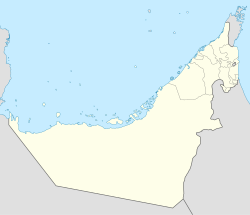Al Qurayyah | |
|---|---|
 View of shops in Al Qurayyah | |
| Coordinates: 25°14′22″N56°21′38″E / 25.23944°N 56.36056°E | |
| Country | |
| Emirate | |
Al Qurayyah is a village in the Emirate of Fujairah, in the United Arab Emirates, some 14km north of the city of Fujairah. It is associated with the Kaabi family. [1] In 2016, construction work on a mosque revealed the existence of a Wadi Suq Period burial site, which has been preserved by the Fujairah Tourism and Antiquities Authority. [2]
